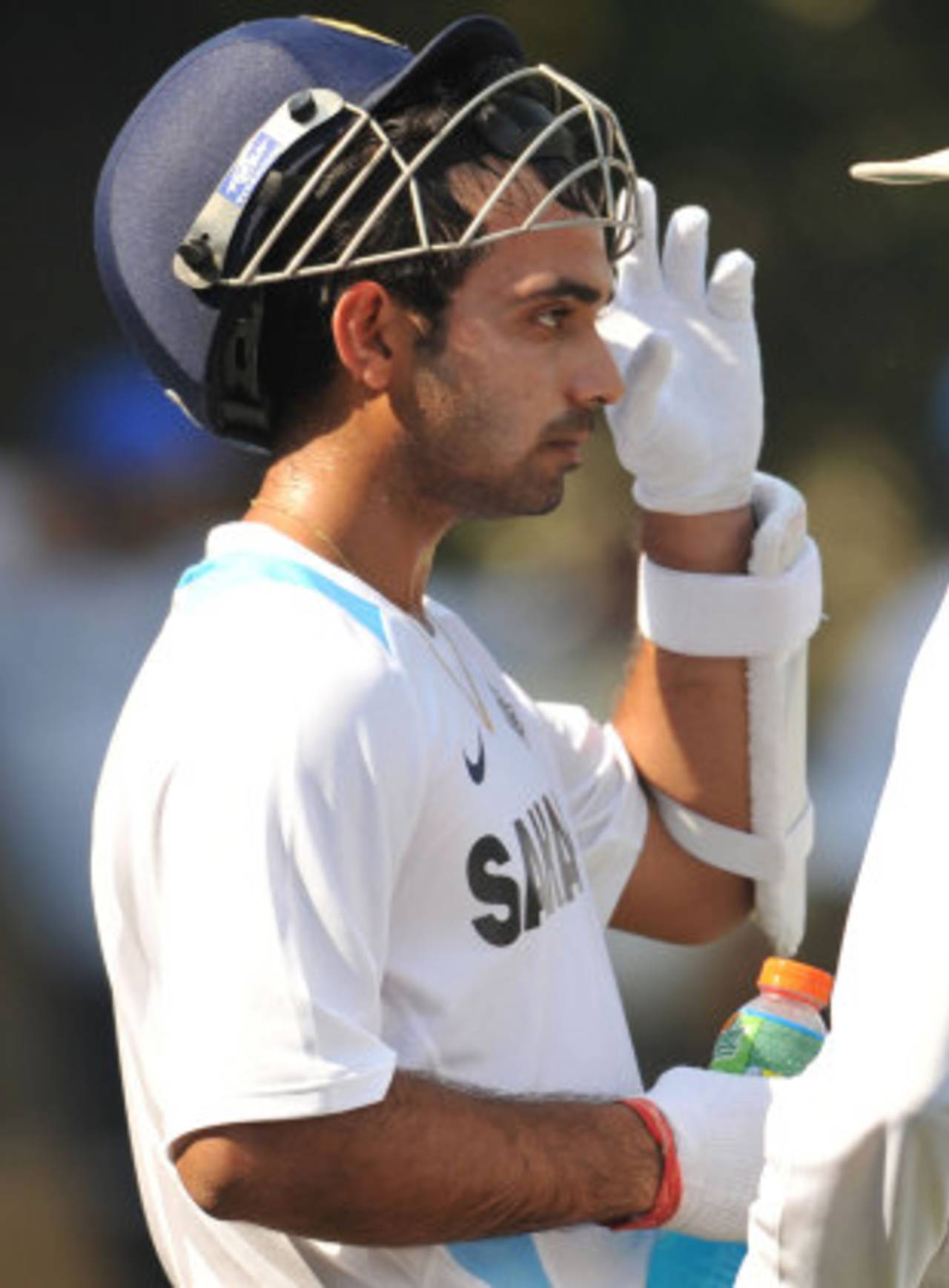Is the wait finally over for Rahane?
A debut has eluded the Mumbai batsman despite a prolonged stint in the Test squad, but that could change in the Delhi Test
Amol Karhadkar
21-Mar-2013

Seven India players have made their Test debut since Ajinkya Rahane was first called up • AFP
Ajinkya Rahane has been a part of India's Test squads for about 16 months. In the 16 Tests India have played since Rahane was named in India's squad for the home Test series against the West Indies, seven players (R Ashwin, Umesh Yadav, Varun Aaron, R Vinay Kumar, Ravindra Jadeja, Bhuvneshwar Kumar and Shikhar Dhawan), including a specialist batsman and a spin-bowling allrounder, have made their debut. Two prolific batsmen (Rahul Dravid and VVS Laxman) have retired, two established openers (Virender Sehwag and Gautam Gambhir) have been axed, and two more batsmen (Cheteshwar Pujara and M Vijay) who returned to the team seem to have made most of their opportunities. Virat Kohli has gone from being a fringe member to being the next in line for the Test captaincy.
Amid all this chopping and changing in the XI, there has been one constant: no matter who the openers are and who bats at No. 6, Rahane has been a permanent drinks-fetcher and substitute fielder.
Three times during his prolonged period as a Test squad member, Rahane's debut was expected by most of the Indian cricket fraternity. Still, while the Jadejas and Dhawans have been rewarded with a Test cap within a week after being called up, Rahane is still waiting for his chance.
With Shikhar Dhawan injuring his fingers on debut last week, Rahane stakes the first claim on the spot vacated, and could also end Mumbai's wait for a Test debutant since Ramesh Powar back in 2007. "I just hope he gets his chance this time around at the Kotla," Ajit Agarkar, Mumbai's Ranji captain, said. "Nobody will doubt the fact that he thoroughly deserves it."
For most of these 16 months, Rahane has been shuttling between domestic and international arena as frequently as he used to change local trains during his growing-up years in Mumbai. Yet, he has averaged 48.72 this domestic season. The fact that it's Rahane's lowest average for a season since making his first-class debut in 2007-08 shows his terrific record.
Still, that's not been enough for him to break into the eleven. For the first four years, the national selectors ignored him since they were never sure "whether he is a middle-order batsman or opener". Then, after he showed promise during his limited opportunities in the limited-overs leg of the England tour in 2011, the selection panel chaired by K Srikkanth told him to be prepared to bat "anywhere between No. 1 and 6".
And then, once Srikkanth passed on the baton to Sandeep Patil, the selectors decided - in consultation with Rahane, hopefully - that Rahane was best suited to bat in the middle order. As a result, though he opened Mumbai's innings in the 2011-12, the Mumbai team management was asked to utilise him at No. 3 this season.
Former India batsman Praveen Amre, during whose five-year association with the Mumbai Ranji team Rahane burst on to the first-class scene, feels Rahane is unnecessarily criticised for shuffling his batting position. "During my stint [as the Mumbai coach], we used him as an opener as well as at No. 3," Amre said. "And he proved us right all the time. He is one of the few batsmen who can adapt to batting at the top of the order and in the middle order."
Agarkar also feels that Rahane's strength of being flexible about his batting position doesn't get due credit. "To be honest, it doesn't matter whether he opens the innings or bats in the middle order," Agarkar said. "Wherever he bats, he always scores runs, which seals the deal for him."
Despite waiting in the wings for well over a year, none of the Mumbai team members have seen him flustered during this period. The reason, according to Dhawal Kulkarni, his usual room-mate while playing for Mumbai, is "his focus". "He keeps things really simple," Kulkarni said. "He knows very well that he has to be patient till his chance comes and make sure he keeps on doing what he does the best and loves the most - to keep on scoring consistently. And it works for him."
Rahane averages an astonishing 62.04 after 100 first-class innings. So what sets him apart from the rest? "Not too many youngsters around are as hardworking as him. It reflects in everything he does on the field," Agarkar said.
While his approach has helped him through the wait for the Test cap, his perseverance hasn't paid off with everything that he has done. "During the Emerging Players tournament in Australia [in 2009], we used to cook for each other. And invariably every time he used to goof it up," Kulkarni recalled.
No doubt Kulkarni will be the first one to be ready to cook a dinner for his friend if he finally gets the Test cap at the Kotla on Friday.
Amol Karhadkar is a correspondent at ESPNcricinfo